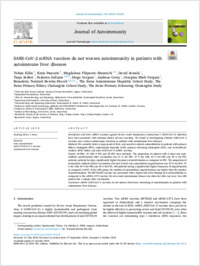SARS-CoV-2 mRNA vaccines do not worsen autoimmunity in patients with autoimmune liver diseases
- Kälin, Tobias ORCID Faculty of Biomedical Sciences, Università della Svizzera italiana, Switzerland
- Passarin, Katia Independent biostatistician, Switzerland
- Filipowic-Sinnreich, Magdalena Clinic for Gastroenterology and Hepatology, Medizinische Universitätsklinik, Kantonsspital Baselland, Liestal, Switzerland - Department of Biomedicine, University of Basel, Switzerland
- Semela, David Gastroenterology and Hepatology Department, Kantonsspital St. Gallen, Switzerland
- Seifert, Tanja Institute for Experimental Immunology, affiliated with EUROIMMUN Medizinische Labordiagnostika AG, Luebeck, Germany
- Sallusto, Federica ORCID Institute for Research in Biomedicine (IRB), Faculty of Biomedical Sciences, Università della Svizzera italiana, Switzerland - Institute of Microbiology, ETH Zurich, Switzerland
- Vergani, Diego MowatLabs, Faculty of Life Sciences & Medicine, King's College London, King's College Hospital, London, United Kingdom
- Cerny, Andreas Epatocentro Ticino, Lugano, Switzerland
- Mieli Vergani, Giorgina MowatLabs, Faculty of Life Sciences & Medicine, King's College London, King's College Hospital, London, United Kingdom
- Terziroli Beretta-Piccoli, Benedetta ORCID Institute for Research in Biomedicine (IRB), Faculty of Biomedical Sciences, Università della Svizzera italiana, Switzerland - MowatLabs, Faculty of Life Sciences & Medicine, King's College London, King's College Hospital, London, United Kingdom - Epatocentro Ticino, Lugano, Switzerland
- 2024
Published in:
- Journal of autoimmunity. - 2024, vol. 149, no. 103325
English
Introduction and aims: mRNA vaccines against Severe Acute Respiratory Coronavirus 2 (SARS-CoV-2) infection have been associated with immune-related adverse reactions. We aimed at investigating whether SARS-CoV-2 vaccines may worsen autoimmune reactions in patients with autoimmune liver diseases. Methods: We centrally tested a large panel of liver- and non-liver-related autoantibodies in patients with primary biliary cholangitis (PBC), autoimmune hepatitis (AIH), primary sclerosing cholangitis (PSC), and in healthcare workers (HW) before and after SARS-CoV-2 mRNA vaccines. Results: 49 PBC, 35 AIH, 9 PSC and 38 HW were included. The proportion of subjects with at least one autoantibody positivization after vaccination was 11 % for HW, 37 % for AIH, 35 % for PBC and 56 % for PSC patients, patients having a significantly higher frequency of positivization as compared to HW. The proportion of seropositive subjects before vaccination who had at least one autoantibody negativization was 25 % for HW, 57 % for AIH, 40 % for PBC and 50 % for PSC, AIH patients having a significantly higher frequency of negativization as compared to HW. In the AIH group, the number of autoantibody negativizations was higher than the number of positivizations. The BNT162b2 vaccine was associated with a higher risk of developing new autoantibodies as compared to the mRNA-1273 vaccine. No new-onset autoimmune disease was observed after one year. One AIH patient had a relapse after vaccination. Conclusion: mRNA SARS-CoV-2 vaccines do not induce short-term worsening of autoimmunity in patients with autoimmune liver diseases.
- Collections
- Language
-
- English
- Classification
- Medicine
- License
- Open access status
- hybrid
- Identifiers
-
- DOI 10.1016/j.jaut.2024.103325
- ARK ark:/12658/srd1331226
- Persistent URL
- https://n2t.net/ark:/12658/srd1331226
Statistics
Document views: 56
File downloads:
- Terziroli_2024_Elsevier_Journ autoimmun_SARS-CoV-2 mRNA vaccines: 64
